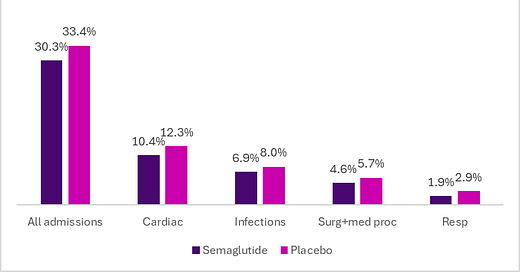Summary: Those on GLP-1s had 11% lower hospitalization rates in this randomized trial.
Source: Obesity Society, November, 2024 as reported in Medscape
The GLP-1 drug semaglutide (sold as Ozempic for diabetes and Wegovy for weight loss) has already been shown to have substantial health benefits, including decreased progression to renal failure, decreased major adverse cardiovascular event, improved mortality, and decreased joint pain. A study presented at the Obesity Society conference last week demonstrated that semaglutide was associated with a decrease in hospitalizations for all causes and specifically for cardiac disease, infections, surgical and medical procedures, and respiratory disease. All of these differences were statistically significant.
These results are from a randomized trial with 17,604 patients which included those over 45 years old. This is relevant to employer-sponsored health plans because the average age of participants is under 62. The decrease in hospitalizations is significant (11% lower overall, 18% less in cardiac disease), and those on semaglutide had 19 fewer hospital days per 100 patient years on average. Such a decrease in hospitalization could help strengthen the case that semaglutide is cost effective. However, like most medical interventions it is unlikely to be cost saving, since saving 1.9 hospital days per person per year is not likely to fully offset the high cost of these medications.
This study has not yet been published in a peer-reviewed journal, but likely will be in the coming months.
Implications for employers:
This study demonstrates the potential for medical cost savings that could partially offset the costs of semaglutide.
These medications remain exceptionally expensive. Many patients have chosen to obtain these through compounding pharmacies, and some employers are considering this.
Lower acquisition costs of GLP-1 medications would help make more employers likely to offer coverage for these medications.




Some interesting details in the Medscape summary. The non-elective hospitalizations were reduced in the overweight/obese non-diabetic population. I wonder what the difference was in just the obese population?
They also note “We have not looked at these analyzes specifically to ask what the relationship is between the degree of weight loss and hospitalization." I wonder if what degree of hospitalization reduction occurs in this time period as a result of bariatric surgery or weight loss associated with other medications or diet alone?
They should also be able to determine the severity of these admissions more specifically than length of stay.
Lastly they note that there may have been bias in the determination of who should get admitted favoring admitting obese and overweight people. It'll be interesting to read the full paper when it's published.